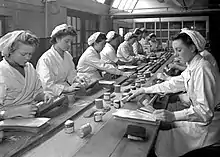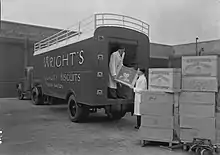Wright's Biscuits
Wright's Biscuits (also Wright's (South Shields)) were established in 1790 by L Wright & Son. In the 1930s they implemented intensive factory methods for production and became a national supplier of biscuits, cakes and groceries as well as a leading employer for Tyne and Wear.
| Founded | 1790 (public company in 1936) |
|---|---|
| Defunct | 1973 |
| Headquarters | South Shields, Tyne and Wear |
Area served | United Kingdom |
Children's illustrator Mabel Lucie Attwell created the Wright's logo, a curly-haired boy called Mischief. The Mischief Club existed for children with members getting a collectable badge.
History

Wright's Biscuits was established in 1790 at Holborn in South Shields to produce ships' biscuits.
After a fire in 1898, completely new buildings were created at Tyne Dock.
The Second World War saw day and night production for the Army. Around 300 employees, mostly women, worked shifts around the clock.[1]
The organization became a public company in 1936. At the first AGM, the company was described as "commenced from nothing only four years ago".[2]
In 1962 J Lyons took control of the Wright's Cakes factory with Wright's Biscuits considering national van sales of cakes to no longer be sufficiently profitable.[3] In the same year Wright's Biscuits bought Kemp Biscuits from Scribbans.[4]
By 1966, due to the losses by Kemp Biscuits Ltd, the growth of Wright's Biscuits was hampered.[5]
In 1971, Cavenham Foods bought the controlling shares in Wright's Biscuits, which in turn controlled the supermarket retailer Moores Stores, from chairman Willie Webster for £6.5 million.[6][7] Cavenham Foods completed the purchase of the remaining shares against hostile shareholders.[8][9] At the time Moores had 685 stores, while in addition to its biscuit business, Wright's operated 488 grocery stores.[10]
In 1972, United Biscuits took over Wright's Biscuits, Kemp Biscuits Ltd and Carr's of Carlisle from the Cavenham Foods group.[11][12] In October 1972 the company was put into administration and the factory finally closing in 1973.[13]
The factory was reopened in 1975 under the name of Lowe's for the production of dog biscuits. This ran until 1983 at which time the factory and the chimney (a landmark for Tyne and Wear Dock area) were demolished.[1]
References
- Bell, Adam. "Ships' biscuits were a bit of all Wright – Cookson Country". Shields Gazette. Retrieved 7 July 2011.
- "Wright's Biscuits; Prospectus Estimates Exceeded". The Times. 31 August 1937. p. 17.
- "Wright's Biscuits Deal With J. Lyons". The Times. 30 August 1962. p. 14.
- "Biscuit Firm's Turnover Up; Big Improvement By Subsidiary". The Times. 19 November 1965. p. 19.
- "Wright's biscuits growth checked by Kemp losses". The Times. 16 September 1966. p. 17.
- "Goldsmith is Unstoppable". Food & Drink Weekly. 1 October 1971.
- "Who will laugh kast?". Investors Guardian. 1 October 1971.
- "Rebels rally to fight Cavenham's twin takeover bid". The Evening Standard. 7 October 1971.
- "Cavenham offer for Wright's Biscuits Opposed". The Daily Telegraph. 2 October 1971.
- "Cavenham Ltd". Retail Trade Developments in Great Britain, 1976-1977. 1976. p. 222. ISBN 9780716103066.
- "Mr Goldsmith takes Paris by storm; Mr Jimmy Goldsmith's Cavenham group is buying its way into a major French combine. Maurice Corina, Industrial Editor, describes a meteoric career". The Times. 14 April 1972. p. 19.
- Massey, Doreen B.; Meegan, Richard A. (1982), The anatomy of job loss: the how, why, and where of employment decline, Taylor & Francis, p. 80, ISBN 978-0-416-32360-3
- "Wright's Biscuits Limited". The Times. 17 October 1972. p. 21.
